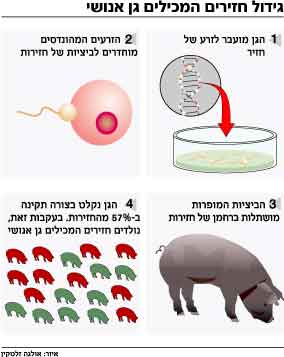Biology / Pig organs cannot yet be used as a substitute for transplants, because the human immune system rejects them
Tamara Traubman

Breeding pigs containing a human gene
Despite the advocacy conducted in recent years to encourage organ donations, doctors all over the world still report a shortage of organs for transplantation. One of the ways proposed by scientists to overcome the shortage problem is the transplantation of pig organs - mainly heart, kidneys, liver and skin. However, today such transplants are not carried out, because the human body will reject the foreign transplant. Some researchers in Italy are trying to create a new breed of pigs, whose organs will be used for transplantation in patients. Recently, researchers implanted a gene taken from humans into pigs, so that the human immune system would not quickly reject the transplant.
The idea of alleviating the shortage of organs for transplantation by using pig organs arose about a decade ago, when it became clear that pig organs are similar in size and shape to human organs. Scientists are now trying to add human genes to pigs that will affect the action of other genes present in the pig, and in this way create pigs that are more suitable for transplantation.
In most cases, foreign genes are introduced into animals by injecting the new gene into a fertilized egg. The egg with the new gene develops into an embryo, and in cases where the process is successful, an animal is born that also carries the new gene. However, according to Dr. Maria-Lucia Lavintrano, a researcher from the University of Milan and head of the research team, "this method is very successful in mice, but is not as effective in farm animals."
Instead of inserting it into the egg, Dr. Lavintrano and her colleagues inserted the human gene into the sperm of pigs. "The seed has a property, that it naturally collects DNA from the environment," explained Dr. Lavintrano. "We decided to use this feature, and grew pig seeds on a medium that contained the human gene."
After the new gene was inserted into the seeds, Dr. Lavintrano used them to fertilize pig eggs. About 57% of the 93 pigs born as a result contained the human gene. This is a high success rate compared to direct injection of a gene into the egg (only 4%). "What we have achieved with high efficiency and low cost is genetically modified pigs that contain human protein," said Dr. Lavitarano. The researchers found that the gene was active in many types of tissue, including heart, lung and kidney. Their research was published yesterday in the scientific journal "Proceedings of the National Academy of Sciences."
The importance of the experiment is mainly commercial. In the past, other researchers have already succeeded in canceling the action of one of the genes responsible for the production of "alpha-1-galactose" - a substance that causes the human immune system to quickly reject the foreign implant. Other researchers have even succeeded in replicating genetically engineered and cloned pigs.
To create pig organs suitable for transplantation, scientists must solve two major problems: to overcome the rejection problem, additional genes must be changed in the pig (at least five); Also, diseases that exist in pigs may be transferred to transplanted animals.
In addition, pig organ transplants in humans raise ethical problems. Some of the opponents of transplants claim that this is immoral because the pigs for transplants are raised in harsh conditions and in the end they are slaughtered. Other opponents claim that for religious reasons one must be careful of fundamental changes in the act of creation, and also according to Jewish law the use of pig organs in humans is problematic.

One response
Unprofessional review. According to Jewish law there is no such problem.